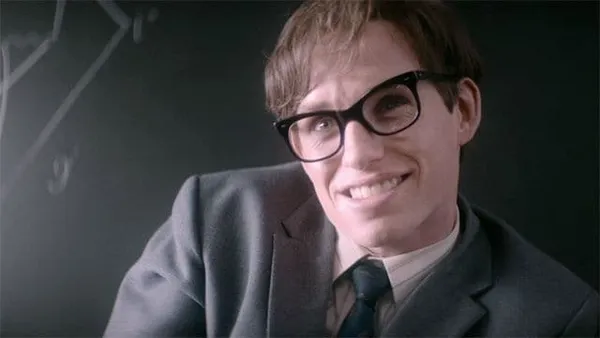Eye For Film >> Movies >> The Theory Of Everything (2014) Film Review
The Theory Of Everything
Reviewed by: Jennie Kermode

He probably understands more about space time than anyone else alive, and has revolutionised our understanding of physics, but inevitably Stephen Hawking is known as much for the disease that happened to him as for the things he made happen. This portrait of his early career, based on the book written by his first wife, looks at the development of that disease, its impact on his work, and its impact on their relationship.
If you've seen one film about sunny days for privileged young things at Cambridge University, you've seen them all, and this film starts out as it means to go on, making the most over every available cliché. Everybody is elegantly dressed, unfailingly polite and only faintly smug, whether attending dances, playing croquet or racing boats along the Cam; the only misbehaviour comes in the form of Stephen's persistent lateness, perhaps an early sign of his illness (there are several of these, delivered with a rare subtlety that the film sadly loses later on), perhaps just a sign of how distracted he is by his ideas. He's a likeable, awkward teenager who doesn't know how to talk to girls. It's overfamiliar but charming enough in its lightweight way.

The meat of the film is built around Stephen's diagnosis, the impact of being told he has two years to live, his determination to finish as much of his work as he can in that time, and Jane's determination to stay with him. Like most kinship carers she struggles to balance her own needs with the centrality of his, knowing how horribly things can go wrong if she lets her attention wander for a moment, and she is gradually isolated by that quiet mixture of awe and revulsion with which outsiders respond to such devotion. When she finally meets a man who understands (local churchman Jonathan, played with studied niceness by Charlie Cox), the emotional impact is overwhelming. Stephen's acceptance of this, and the received moral code that persuades her to keep it platonic, do little to interrupt a natural progression born of loneliness.
This ought to be the stuff of powerful drama; instead it feels like a life insurance commercial. It might be more palatable if it were honest about being the story of Jane rather than Stephen - its ostensible hero is often sidelined in the polite way that often happens to the disabled - but despite Felicity Jones' frantic emoting there is very little depth to her portrayal. Eddie Redmayne captures the physical aspects of Stephen perfectly - not an easy thing to do across years of progressive illness - and communicates impressively well when, at times, his spoken words are impossible to understand (there is a merciful absence of subtitles), yet we rarely see beneath the surface of this complicated man. The film touches only briefly on his loneliness, on the frustrations of his increasing inability to interact with the world, knowing the theory of everything yet able to practice nothing, so our perspective on the central relationship is one-sided and much of its dramatic potential is squandered.
Most disappointingly, Stephen's passion for physics is largely absent from this film; it's talked about but rarely shown, despite the fact that the man himself has cited it as the reason for his survival. It's not just that the science we are presented with is clumsily presented and sometimes flat out wrong (the concept behind A Brief History Of Time is introduced as if it were a Laydbird book), it's that it's treated as a triviality, a mere detail. With his work sidelined and his personality elided, there's not much of this man for us to see.
Prettily shot and glossily produced, this is a film that's easy to like but equally easy to forget, being almost entirely content free. Very occasionally it touches on something more serious and substantial, as when Jane is shocked to be asked by a doctor if she wants him to bother to save the life of her ailing husband, but these important moments are all too easily forgotten in a film whose sentimental Hollywood ending would better suit a Disney tale about lost kittens than that of one of the most brilliant thinkers of our age.
Reviewed on: 01 Dec 2014
















